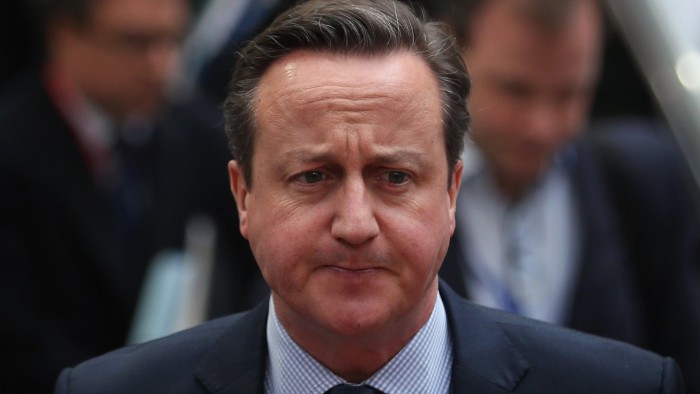Cameron calls on EU for ‘live and let live’ approach to Britain

Roula Khalaf, Editor of the FT, selects her favourite stories in this weekly newsletter.
David Cameron urged European leaders on Thursday night to settle Britain’s vexed EU relationship “for a generation”, as France and Belgium insisted that any deal agreed was the final word and would never get any better.
Mr Cameron, speaking at the start of a two-day EU summit in Brussels, urged colleagues to adopt a “live and let live” approach to Britain, where the UK would gain a special deal on the edge of a more integrated bloc.
“The question of Britain’s place in Europe has been allowed to fester for too long and it’s time to deal with it,” he said.
Mr Cameron hopes that a deal can be struck in Brussels on Friday, allowing him to press ahead to a referendum on Britain’s EU future on June 23; talks were scheduled to last into Thursday night.
Opening exchanges over the British deal lasted for some two-and-a-half hours, with Mr Cameron telling EU leaders that he would not accept any deal that was not “credible” to voters at home.
“The going was tough,” said a British official, adding that none of the EU leaders moved from their original negotiating positions. “It’s going to be a long night.”
Mr Cameron was scheduled to hold late-night talks with European Council president Donald Tusk to map out a way forward, while officials were despatched to try to negotiate a compromise in the early hours.
While many EU officials insisted that a deal was likely on Friday, British officials were keen to play up remaining differences on issues including welfare for migrant workers, protections for the City of London and the need for treaty change.
Mr Cameron said that if the deal on the table on Friday was not good enough, he would simply walk away. “He doesn’t have to hold a referendum until the end of 2017,” said one British official.
Earlier, it emerged that some European countries, led by Belgium and France, were pressing for a “self-destruct clause”, closing down the option of a second negotiation and referendum should Britain vote to leave.
Some Brexit campaigners have claimed that it would be “safe” for Britons to vote to leave the EU, on the basis that Mr Cameron would then have a mandate to return to Brussels to seek a much better deal.
Belgium, supported by France, is pushing for a statement in the summit communiqué making it explicit that this would be the final British “settlement” and that there would be no second chance.
Mr Cameron’s team admitted that the idea was being discussed; indeed it fits well with the prime minister’s assertion that a Leave vote in the referendum would represent a point of no return.
A senior Belgian diplomat said: “We all know that in the Leave campaign, the argument has been that an ‘out’ vote is just a stepping stone for achieving more.”
When it was suggested that Mr Cameron might have asked Belgium, not the most likely ally in a European negotiation, to propose the idea, a British official said: “It was genuinely not our request.”
Mr Cameron’s plan to restrict benefits to migrant workers remains one of the biggest sticking points.
Disagreements are also felt over the British plan to win “safeguards” against intrusive financial regulation for non-eurozone countries and over Mr Cameron’s insistence on treaty change to enshrine the deal.
“We’ve got some important work to do today and tomorrow and it’s going to be hard,” Mr Cameron said. “I’ll be battling for Britain, if we can get a good deal I’ll take that deal but I will not take a deal that doesn’t meet what we need.”
Jean-Claude Juncker, the European Commission president, said that he remained “quite confident” that a deal would be reached in spite of there being “a number of questions” still to answer.
Dalia Grybauskaite, Lithuania’s president, predicted that “everybody would have [their] own drama — and then we will agree”.
Beata Szydlo, Polish premier, warned that she wanted agreement “but not at any price”.
The latest draft texts make clear that the terms do not come into effect until the UK formally states it is remaining within the EU. Belgium and France want that language made stronger. “The idea is to kill the idea of a second referendum,” said one eurozone diplomat involved in talks.
Charles Grant of the Centre for European Reform said that the second referendum idea would cause problems for the Remain campaign “if people who don’t want to leave the EU think that Out does not mean Out, and that EU partners will be so desperate to keep us that they will give us a better deal”.
“This is totally wrong, of course, because we will not get a better deal,” he added. “Firstly, the treaty makes no provision for half membership. Secondly, they cannot give the British a special sweetheart deal because other countries inside or outside would want the same.”
One senior EU diplomat said that the push for a “self-destruct” clause reflected the “gloom” around Brussels over the prospects of Mr Cameron’s winning a referendum campaign to stay in the EU.
Another ambassador in Brussels doubted that there would be support for the Franco-Belgian clause. “We’ll need a second referendum,” the ambassador said. “We need the UK in the EU.”
Follow latest developments: EU referendum live
Comments